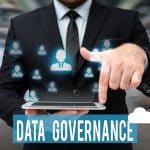Hyperscale, cyber vaulting and tougher policies -- storage and data predictions for 2023

Data is increasingly seen as being among and organization’s most valuable assets and businesses are generating more and more of it.
But of course it has to be stored and kept secure. Much of it is in an unstructured form too, which creates additional challenges. We asked some experts in the data and storage field to give us some predictions for this sector in the coming year.
Why Data Quality is critical for business

Since the explosion of technology in the last few decades, data has been increasingly positioned as a silver bullet that can fix all the trials and tribulations of the modern world. For those giant tech companies who amassed mass amounts of (mostly) third-party data, data was the new oil -- sold in barrels to any company wanting to find and scale an audience. But KPIs on data effectiveness became increasingly viable, businesses began to question the amount of data they’d bought.
Parallel to this, governments and consumer rights groups became aware of the increasing volume of unwanted noise being thrown at potential clients and customers. Businesses, both B2B and B2C, became liable for data missteps -- case in point with Meta being fined 17m euro for what amounted to bad data housekeeping.
Security and access are top issues for data engineers

More than half (54 percent) of respondents to a new survey say securing data with appropriate access rights is one of their biggest hurdles. While almost 60 percent believe their organizations should be placing extra emphasis on data security.
The third annual State of Data Engineering Survey from Immuta also finds that that 89 percent of organizations report missing business opportunities because of data access bottlenecks.
Becoming a data-informed organization

We hear a lot of talk these days about the virtues of data-driven organizations. That’s certainly reasonable up to a point -- but what does it really mean? When it comes to routine operational decisions, in particular, the current bias seems to favor increased automation over human judgment. The data doesn’t lie -- or so the story goes -- so we’re better off deferring to programmatic decision models.
That may be reasonable for some situations, but when you’re operating in a complex and nuanced domain, take casualty insurance claims for example, that highly automated decision paradigm can begin to fall apart very quickly. Thousands of different variables come into play. Medical records and accident reports contain subtle details that provide vital clues about potential risks. To complicate matters further, important minutiae are often buried deep inside the narrative content.
How to choose the safest data center [Q&A]

Data centers around the world are currently home to an estimated 1,327 exabytes of data. This information has a potentially huge value so it needs protecting.
But as more businesses choose to trust their information to external data centers how can they be sure that it's going to be properly secured? We spoke to Oliver Pinson-Roxburgh, CEO of Defense.com, to find out how organizations can choose the most secure data center possible?
Understanding static and dynamic data

Data collection practices receive increasingly more attention and sophistication. Web scraping, and automated acquisition processes in general, changed the nature of data collection so much that old challenges were solved and new problems emerged.
One of them is the selection of data in regards to dynamicity. Since now we’re able to collect unthinkable volumes of information in mere seconds, getting some particular sample is no longer an issue. Additionally, in business, we will often scour the same sources over and over to monitor competition, brands, and anything else that’s relevant to the industry.
Better governance is crucial to getting value from data

Data is increasingly one of the most valuable resources that businesses have, but extracting that value requires effective management of content.
A new survey from Rocket Software of more than 500 corporate IT professionals across multiple industries in the US, UK and APAC regions shows that business data is still vastly unstructured with 81 percent of respondents indicating that at least some of their data is considered 'dark'.
How fake data can help to combat breaches [Q&A]

September this year marked five years since the notorious Equifax data breach which exposed the social security numbers, birthdates, credit card details, and more of millions of customers.
But how much has the industry learned from this breach? And what measures can be used to help avoid similar issues in the future? We spoke to Ian Coe, co-founder at Tonic.ai to find out why fake data might be the answer.
Why data science is failing marketers

Companies can now gather more information about their customers than ever before. But according to a new study data science is not benefiting marketers, with 84 percent of marketing executives saying their ability to predict customer behavior is guesswork.
The report from predictive analytics company Pecan AI, based on surveys carried out by Wakefield Research, finds four out of five marketing execs report difficulty in making data-driven decisions despite all of the consumer data at their disposal.
Your personal data has become an AI training manual and you're not getting it back

Art imitates life, that we all know. But what if art imitates your personal life, your personal likeness and does it so well that the line between what is real and surreal blurs?
Unbeknownst to us, we are becoming models for state-of-the-art AI technology that trains on terabytes of poorly filtered data scraped from all over the web. This data can include our personal photos, medical images, and even copyrighted content -- basically, anything ever posted online.
Turbulence ahead -- why businesses are still falling short when it comes to data

While nearly everyone knows that data is important, almost no one is able to use it to its full potential. Each and every organization is generating and using data in daily operations but 98 percent of our recent Data Health Barometer survey cohorts in the UK admitted that their organizations are dealing with challenges in using data effectively. Nearly half say it's not easy to use data to drive business impact at all, which is even worse as we head into a period of potential UK-wide economic uncertainty.
The most significant questions for data professionals are whether they have full visibility of all data that is available across their business to help them make reliable decisions according to that data; an understanding of how exactly the data is relevant to the company overall but also to their own individual role in the business; if they know how to use that data to its full potential in an ever-growing competitive business marketplace and have access to the data they need in real-time, wherever it may be.
How long does it take hackers to collect data?

Can you imagine how scary it would be to show up to work one day, ready to dominate, and then BAM! All your confidential files have been stolen, and your computer is now a breeding ground for cyber viruses.
How about if you just launched a new product, which you’ve been advertising for months, and suddenly your website is down, and customers are being redirected to a competitor’s site? Or worse -- you can’t access your online banking account anymore.
Is data a silver bullet for the slowing economy?

During the pandemic, companies with a strong understanding of their business as a whole, including employees, partners, customers and even suppliers, fared better than those without the ability to review and use data to drive growth.
History has shown that the greatest weapon against uncertainty is information. Understanding your business at a microscopic and holistic level is now more important than ever, as the threat of a recession looms. This means that information must be treated as a central tool in leading all businesses through any potential storm.
How to use data to anticipate consumer behavior [Q&A]

Businesses are starting to recognize the advantages of leveraging data-driven approaches to improve customer experience. These approaches are also hugely valuable when included in strategic roadmaps to increase engagement and return on investment.
Analytical data is ideal for businesses wanting to assess the needs of their target customers to deliver personalized experiences and attain more accurate forecasting and demand planning. Moreover, data from analytics promotes more effective inventory and supply chain management, compounding supply and fulfillment issues businesses are currently experiencing
Why enterprises need to treat data as a first class citizen [Q&A]

Data has become increasingly important for modern businesses and they increasingly expect it to help them improve their delivery to customers and ultimately their bottom line.
We spoke to Dom Couldwell, head of field engineering, EMEA at DataStax to discuss how companies can use data and how they need to adapt their approach to do so effectively.
Recent Headlines
Most Commented Stories
BetaNews, your source for breaking tech news, reviews, and in-depth reporting since 1998.
© 1998-2025 BetaNews, Inc. All Rights Reserved. About Us - Privacy Policy - Cookie Policy - Sitemap.